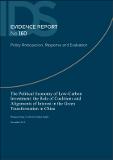| dc.contributor.author | Dong, W | |
| dc.contributor.author | Qi, Y | |
| dc.contributor.author | Spratt, Stephen | |
| dc.coverage.spatial | China | en |
| dc.date.accessioned | 2015-11-02T15:21:35Z | |
| dc.date.available | 2015-11-02T15:21:35Z | |
| dc.date.issued | 2015-11 | |
| dc.identifier.citation | Dong, W.; Qi, Y. and Spratt, S. (2015) The Political Economy of Low-Carbon Investment: the Role of Coalitions and Alignments of Interest in the Green Transformation in China, IDS Evidence Report 160, Brighton: IDS | en |
| dc.identifier.uri | https://opendocs.ids.ac.uk/opendocs/handle/20.500.12413/7124 | |
| dc.description.abstract | The primary motivation behind this research is the need to accelerate the supply of renewable energy because of the important role that it plays in mitigating climate change and in fostering sustainable development.
Understanding past drivers for low-carbon investment can help us identify those for the future, and what could accelerate such investment. Investment in renewable energy can be modelled as a problem of technical asset allocation or optimisation at the firm or sectoral level, but is not entirely explained by this approach – the context in which actors are involved, their motivations and the wider systems in which they operate must also be taken into account. The interactions between actors may sometimes accelerate investment and sometimes prevent it; however, understanding the dynamics of these processes is crucial if we are to shape them. This report is part of a two-part study focusing on the wind and solar power sectors in China and India, which aims to find and compare drivers for investment in renewable energy. This report takes the example of China.
This China-based research examines ten case studies: four wind power and six solar power. They have been selected according to investment data and industrial characteristics. Each study covers the period during which investment in renewable technologies was at its peak and all are representative of the corporate financing at that time. For each, we reviewed all of the available literature (an abundance of papers and reports) and conducted face-to-face interviews. Our interviewees ranged from wind turbine and solar photovoltaic (PV) manufacturers, to employees of state-owned enterprises and banks, to local and central government officials (particularly from the National Development and Reform Commission and the Ministry of Commerce), as well as other researchers. | en |
| dc.description.sponsorship | UK Department for International Development | en |
| dc.language.iso | en | en |
| dc.publisher | IDS | en |
| dc.relation.ispartofseries | IDS Evidence Report;160 | |
| dc.rights.uri | http://creativecommons.org/licenses/by/3.0/ | en |
| dc.subject | Climate Change | en |
| dc.subject | Environment | en |
| dc.title | The Political Economy of Low-Carbon Investment: the Role of Coalitions and Alignments of Interest in the Green Transformation in China | en |
| dc.type | IDS Evidence Report | en |
| dc.rights.holder | IDS/Tsinghua University, China | en |
| dc.identifier.ag | OT/11009/7/1/1/547 | |


